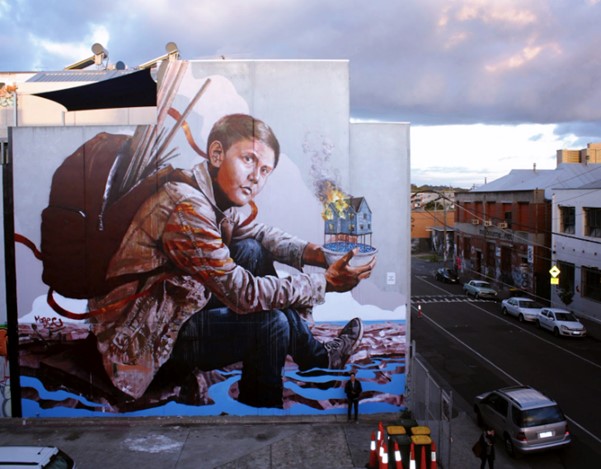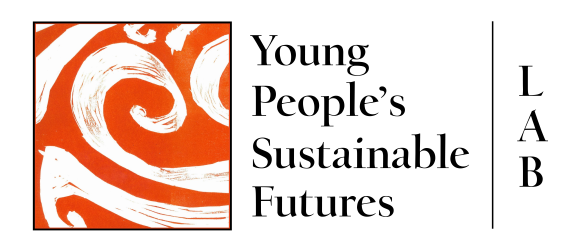
Culturally Diverse Young People, Education, and the Crises of the Anthropocene
Australia’s increasing diversity, with 29.1% of its population being born overseas, has led to the popularisation of the term ‘Culturally and Linguistically Diverse’ (CALD) (Pham et al. 2021:2; ABS 2021). In education discourses, this term is often associated with the challenges experienced by CALD young people, which leads to decreased educational engagement and transitional employment barriers (Osipova & Lao 2022; 1; Abacioglu et al. 2022:1; Perso 2012:4). Alternative pathways, which emphasise personalised and culturally responsive approaches, have been recommended for at-risk students in supporting their acculturation and re-engagement within education (CMY 2019; Shephard et al. 2021:1432; Van Kooy & Butler 2021:4).
The ‘anthropocene’ has emerged as a term that seeks to describe the most recent period in the Earth’s history (Crutzen & Stoermer 2000:17; Davis et al. 2019:2; Gough 2021:1). The geological term has been informally adapted to mark the level of human impact on the environment (Folke et al. 2021:835). The many crises society faces within the Anthropocene have been described by historian Adam Tooze as a ‘polycrisis’ (Whiting & Park 2023).
In the World Economic Forum Podcast, Tooze discusses the term ‘polycrisis’ in a post-COVID world. Lawrence, Janzwood and Homer-Dixon (2022) propose the concept of global polycrisis ‘as an overarching framework with which to investigate the causal connections of crises across global systems’. They define it as follows:
A global polycrisis occurs when crises in multiple global systems become causally entangled in ways that significantly degrade humanity’s prospects. These interacting crises produce harms greater than the sum of those the crises would produce in isolation, were their host systems not so deeply interconnected. (Lawrence et al. 2022:2).
Research indicates that the effects of such changes are being felt by students within the Australian education system, with both CALD students and the broader student population experiencing higher rates of disengagement, lower attendance, and reduced Year 12 completion rates (OECD 2023: 11; Wolff et al. 2020:27; Cole & Malone 2019:157; Lehtonen et al. 2018:339; ACARA n.d; ACARA 2022). In Prospects for Children in the Polycrisis (2023), the United Nations International Children’s Emergency Fund (UNICEF) identifies COVID-19, a global recession, and misinformation on health, security and freedom as key elements of the polycrisis.
Mission Australia’s Youth Survey Report 2022 echoes these concerns, finding that teens are most concerned with the environment, discrimination, and mental health (Leung et al. 2022:16). In a post-COVID world of blended learning models, the question of whether traditional models are redundant is on the table (Veletsianos & Houlden 2020:849). As discussed by Gough (2021):
Education in the Anthropocene context necessitates a different pedagogy that provides opportunities for learning to live in and engage with the world and acknowledge that we live in a more-than-human world … In particular, education in the Anthropocene will need to be interdisciplinary, transdisciplinary, or cross-disciplinary; intersectional; ecofeminist or post-humanist; indigenous; and participatory.
Across a series of four blogs I will explore, through an extensive review of the literature, the proposition that ‘wild pedagogies’ (Jickling et al. 2018:77-105), as an element of a wider framework of regenerative education (Berg et al. 2022:2; Buckton et al. 2023:826), have the potential to reengage CALD young people in the senior years of schooling. In undertaking this literature review, this series of blogs aims to contribute to the further development of work being undertaken by the Young People’s Sustainable Futures Lab (YPSFL), and to ongoing educational debates about the barriers faced by CALD young people and potential approaches to reducing such barriers.
There are two YPSFL projects that are of particular interest to me as I conduct this literature review, these are Young People’s Education and Employment Aspirations in Geelong and Regenerating Geelong: Young People and the Futures we make with, for and alongside them (YPSFL 2022). Within these two projects, the Lab seeks to understand the experiences of diverse young people, their education and employment aspirations and pathways, and health and wellbeing, in wider contexts of crisis and change (YPSFL 2022; Braidotti 2018:31). At the heart of these projects lies a concern to explore the experiences of young people considered to be disadvantaged and marginalised, and engage them in the co-design of sustainable futures. These projects draw on concepts that assist in the framing of this literature review, including regenerative capitalism, regenerative agriculture, and rewilding (YPSFL 2022). According to Stokel-Walker (2022), regenerative capitalism ‘looks to reconsider our current capitalist ideologies by looking beyond net-zero emission to a new-positive impact on the planet’:
Regenerative capitalism … refers to business practices that restore and build rather than exploit and destroy. Regenerative is about viewing the goal of net-zero carbon emissions as a stop-off on the longer journey to create the conditions for life to flourish resiliently and renew infinitely. (Stokel-Walker 2022)
Thus, it proposes an active, several-steps-forward version of sustainability (Stokel-Walker 2022). This restorative notion is also applied to agriculture, being the application of natural processes to farming (Sahu & Das 2020: 745; Gordon, Davila & Riedy 2023:1833). Thus, regenerative agriculture merges capitalist frameworks of farming with regenerative practices to ensure production in terms of output, whilst ensuring balances are maintained (Khangura et al 2023:2). In contrast to this, rewilding serves as the total removal of all human processes and systems in the restoration and native conservation of the land (IUCN 2021:1). As argued by Schmitz et al. (2023), it is the only approach if society is to successfully prevent climate warming beyond 1.5 °C of pre-industrial levels (Schmitz et al. 2021:324). Thus, rewilding reflects the decolonisation of frameworks society has structured around natural processes and systems (Canalis 2022; Ward 2019).
Stay tuned for Blog 2, where I will examine some of the key barriers that the research literature suggests are typically faced by CALD students in the senior secondary years. Following this, blog 3 will introduce the concept of wild pedagogies within the context of regenerative education as a potential framework for guiding actions to reengage CALD young people. Two main themes will be discussed, including place-based education and experiential learning. Blog 4 will discuss the intersections between the themes I have highlighted, including any potential offerings wild pedagogies might present in re-engaging CALD young people. At the close of Blog 4, I will include a full reference list of sources cited.
